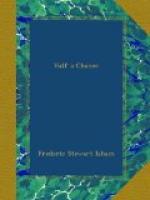So be it; well, destiny now could harm him little more! His eyes gleamed; a reckless light shone out, a daredevil luster. He continued to look at her, then threw back his head.
“I had hoped you would never know; but the gods, it seems,” he could even laugh, “have ordained otherwise. ‘Fata obstant.’” Still that startled, uncomprehending look on the girl’s white face! He went on more quickly, like a man driven to bay. “You do not understand; you are credulous; take people for what they seem,—not for what they are; or have been.”
He stopped; a suggestion of pain creeping into her expression, as if, behind wonderment, she was conscious of something being rudely torn, wrenched in her inmost being, held him. His face grew set; the nails of his closed fingers cut his palms. But the laugh returned to his lips, the luster to his eyes.
“Or have been!” he repeated. “A good many people have their pasts. Can you imagine what mine may have been?”
But she scarcely followed his words; she did not think, she could not; she seemed to stand in a hateful dream! Looking at him—the torn evening clothes!—his face, pale, different! Listening to him!—to what—?
“A convict!” said the man. “Yes; that’s what I was. Had been in jails, jails! And was sent out of the country, years ago, transported. But time went by and the convict thought he might safely come back—boldly—with impunity. The years and—circumstances had altered him—wrought great changes. He felt compelled to return—why, is of no moment!—believed himself secure in so doing—and was—until chance led him out of his accustomed way—to new walks—new faces—where lay the danger—the ambush, into which he, who thought himself strong, like a weak fool, walked—or was led—blindly.” He caught himself up with a laugh. “But what is this to you? Enough, the convict found himself recognized, his identity thoroughly established.”
He waited; still she was silent; the little hands clasped tightly the heavy drapery that moved as if she were putting part of her weight on it. Her expression showed still that she had not yet had time to comprehend; that for her what he said remained, even now, but words, confused, inexplicable. A strange sequel to a strange night, a night that had begun with such gaiety and blitheness; that had been interrupted, after he had left her, by the shouting and rough voices from the garden! She seemed to hear them anew, and afterward, the explanation of that odd little person, the police agent, his apologies for breaking in upon the cotillion. But he had said—?
The blue eyes bent like stars now on this man in her room, standing before her with bold, mocking face, as if his dark eyes read, understood every thought that passed through her brain.
“You!—then it was you—John Steele—that they—”
“The convict they tried to arrest? Yes.”
“You? I don’t—” Her voice was almost childlike.




